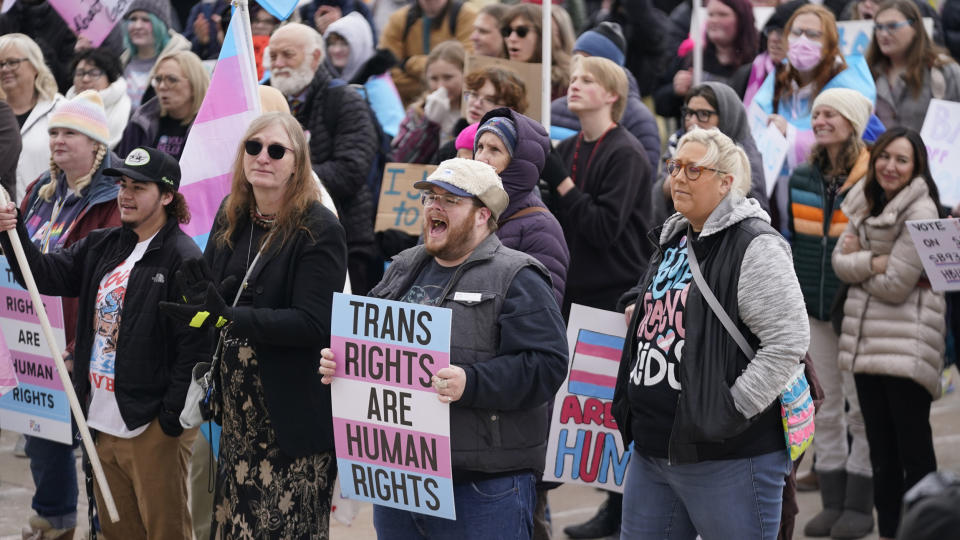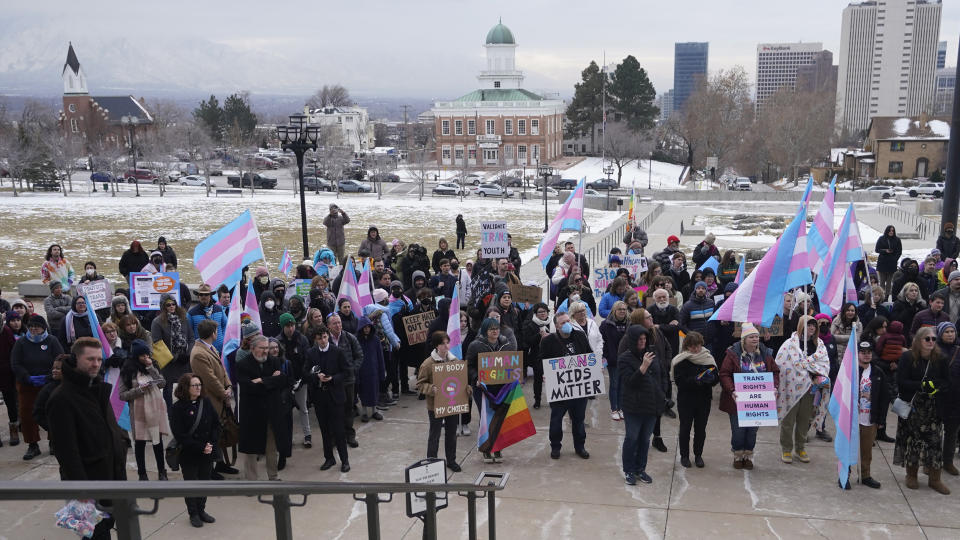Utah's ban on gender-affirming care is set to face a legal challenge
- Oops!Something went wrong.Please try again later.
A new Utah law that bans gender-affirming medical care for transgender minors and places a number of restrictions on providers will soon face a legal challenge from two civil rights groups.
Christopher Vasquez, a spokesperson for the National Center for Lesbian Rights, told NBC News on Tuesday that the group and the American Civil Liberties Union of Utah plan to file a suit against the measure and seek a preliminary injunction within the next two weeks.
Aaron Welcher, a spokesperson for the ACLU of Utah, said in a statement Monday that the ACLU of Arkansas and Alabama have already challenged similar laws in their respective states, and that his group is fighting an ongoing case over the state’s law prohibiting transgender girls from participating on female school sports teams.

“Our mission is to defend and advance all Utahns’ civil rights and individual freedoms, which is what we plan to do,” he said.
Utah’s law went into effect Saturday following the signature of Republican Gov. Spencer Cox. The measure is among a wave of bills seeking to restrict transition-related care for minors that have been considered by dozens of states over the past two years. Four other states have enacted similar measures over the last two years — Alabama, Arizona, Arkansas and Tennessee — though judges have blocked the laws in Alabama and Arkansas from taking effect pending the outcome of lawsuits.
Utah’s measure bars all minors in the state from receiving gender-affirming surgeries, which are rarely performed on minors, and places an indefinite moratorium on minors receiving puberty blockers and hormone therapy if they weren’t diagnosed with gender dysphoria prior to Saturday, when the bill was enacted. (Those who were already receiving such care prior to Saturday can continue.)
The law makes exceptions for intersex youth to receive surgeries and allows minors who experience early puberty to receive puberty blockers. It also allows the treatment for any medically necessary reason that isn’t the treatment of gender dysphoria.
The measure will also place a number of restrictions on health care providers. For example, it requires the state’s Division of Professional Licensing to create a certification for those who provide hormone treatment to minors. In order to obtain the certification, providers must receive “at least 40 hours of education related to transgender health care for minors from an approved organization.”
It will also allow patients who receive gender-affirming care in the state as minors to sue providers for malpractice if they ““disaffirm” consent before they turn 25.
Lastly, the law directs the state’s Department of Health and Human Services to conduct a systematic review of the medical evidence regarding hormone therapy for trans minors and to provide recommendations to the Legislature, but it does not require the Legislature to review the indefinite moratorium on care after the review is complete.

When he signed the measure Saturday, Cox said that though this law isn’t perfect, he is grateful for the “more nuanced and thoughtful approach” that Republican State Sen. Michael Kennedy used while crafting it.
“While we understand our words will be of little comfort to those who disagree with us, we sincerely hope that we can treat our transgender families with more love and respect as we work to better understand the science and consequences behind these procedures,” Cox said in the statement.
During debate over the bill, Kennedy, a family practice physician, said puberty blockers and hormone therapy “lack sufficient long-term research,” according to the local radio station KUER.
Accredited medical organizations — including the American Medical Association, the American Academy of Pediatrics and the American Psychological Association — have supported such care for minors.
A growing body of evidence of at least half a dozen studies has also found that access to puberty blockers and hormone therapy improve mental health outcomes for transgender youths.
Shannon Minter, the legal director of the National Center for Lesbian Rights, told KSL NewsRadio, a local station in Salt Lake City, that “if a child cannot get treatment, they will be harmed, they will become sicker, they’ll become worse.”
“They will suffer very serious consequences … even life-threatening consequences,” he said.
This article was originally published on NBCNews.com

